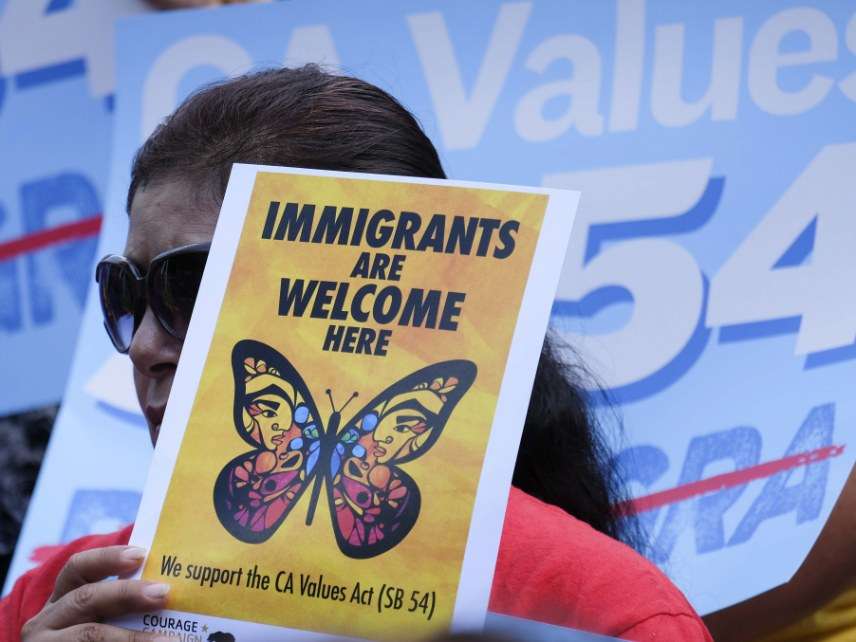California Poised to Block Police from Helping DHS Detain Immigrants—Sometimes
The bill offers many, many exemptions.

Taking the reverse route of Texas, California lawmakers have passed a law restricting the ability of state and local police to cooperate with federal immigration officials.
The bill, SB 54, has been watered down since it was first introduced. This was at the insistence of Democratic Gov. Jerry Brown, who wanted to make sure police and jailers can still help the feds deport people convicted of serious crimes.
The law allows police to cooperate with federal information and detention requests only when an arrested illegal immigrant has been convicted of certain crimes within a given time range. The crimes range from rape and murder to stalking, hate crimes, drug trafficking, and elder abuse; the time range is either five or 15 years, depending on the details of the offense. (To read the full list, go here.)
One change made to the bill, the Los Angeles Times notes, is that California prisons will still be allowed to let federal Immigration and Customs Enforcement (ICE) officials in to interview immigrants. That's one of the demands Attorney General Jeff Sessions has made for municipalities that want to keep receiving federal crime-fighting grants.
SB 54 also calls on the state to develop mechanisms to minimize federal access to database information held by state and local agencies (and private vendors), if the info will be used for immigration enforcement.
Though SB 54 goes through great pains to make it clear that police and jails can cooperate with ICE when dealing with an illegal immigrant with a criminal record, that has not reduced the Justice Department's criticisms of the legislation. A department spokesperson has declared the bill will "return criminal aliens back onto our streets."
But right now the department has a bigger problem. Late Friday a federal judge put a block on enforcement of new Justice Department rules aimed at forcing sanctuary cities to help the feds deport illegal immigrants.
The Justice Department has been trying to tie immigration enforcement to access to federal crime-fighting grants. In July it announced that in order to get access to a specific grants program, cities and counties had to permit Department of Homeland Security (DHS) officials into any detention facility to determine the immigration status of anybody being held there. In addition, local jails had to inform DHS 48 hours before releasing somebody in their custody if they had received a detainer order (a request from DHS to hold a deportable immigrant until a federal official can take the prisoner into custody).
Chicago sued to block the implementation of these rules, and a U.S. district judge concluded the city is likely to win. So he has implemented a nationwide injunction stopping the feds from enforcing the rules. This doesn't mean Chicago has won yet; the rules are merely suspended for now as the case works through the courts.
The new rules the Justice Department is attempting to implement do have some constitutional problems. The conditions Sessions is attempting to implement are not authorized by the text of the law, and so the executive branch is arguably bypassing Congress' power to set the terms for the grants. Furthermore, Chicago has argued that it's unconstitutional to require the city to hold people for 48 hours (or more) for the purpose of handing them over to immigration officials. To read more about Chicago's suit, go here.


Show Comments (14)